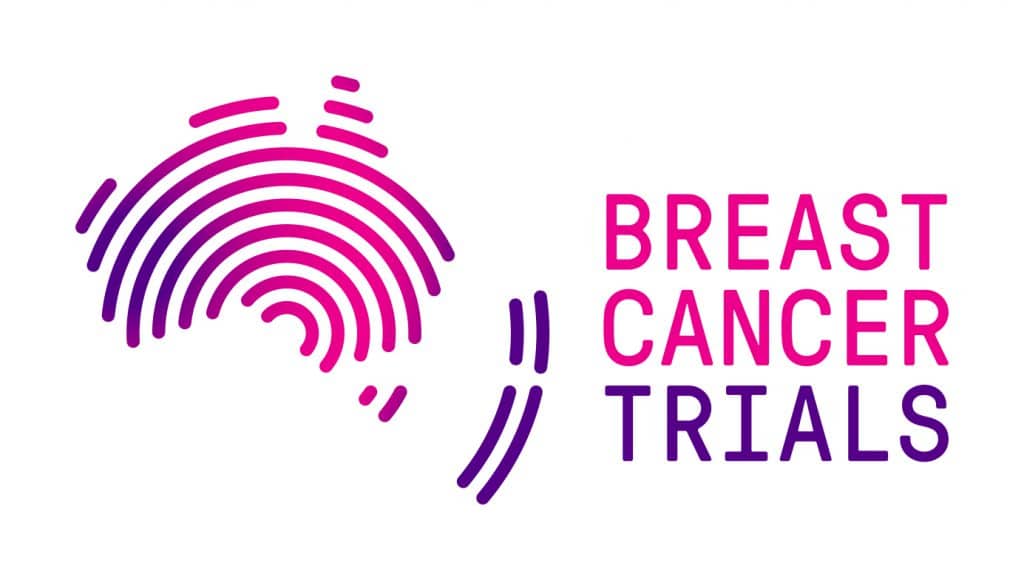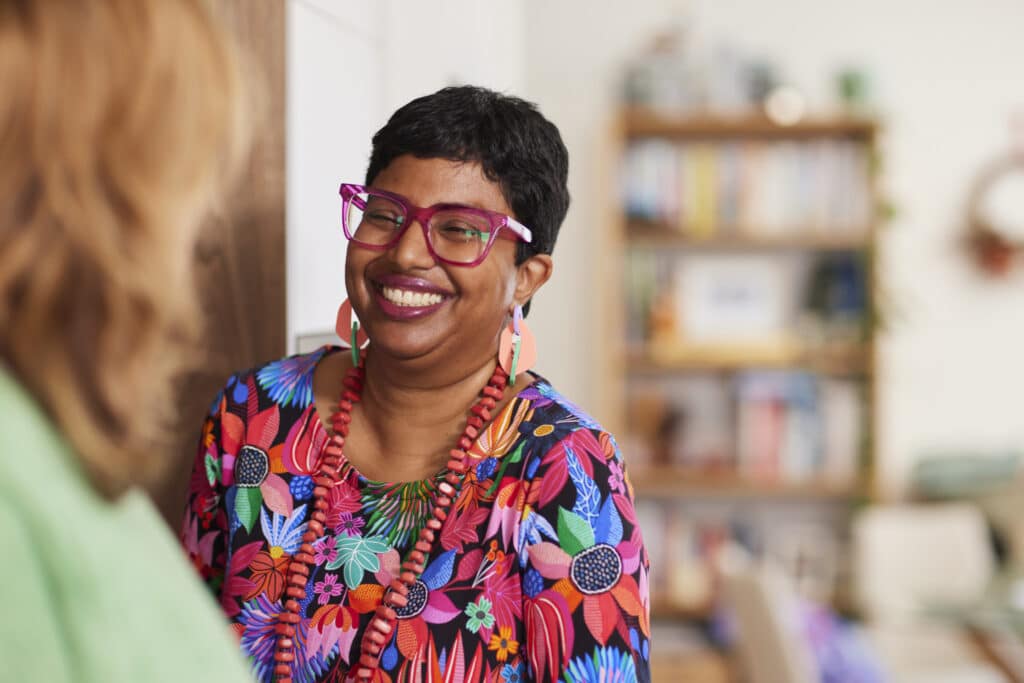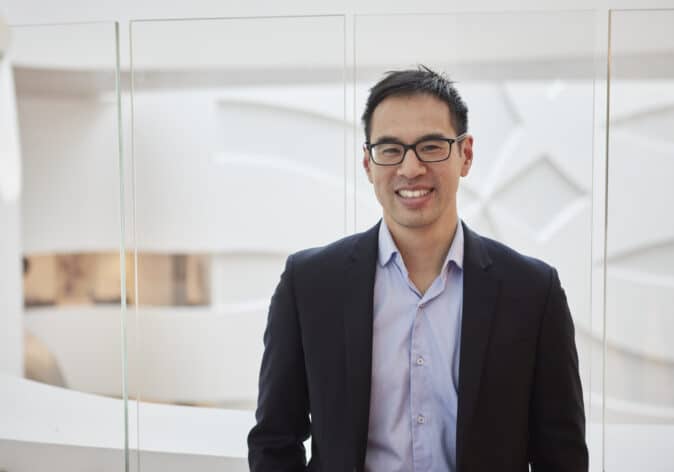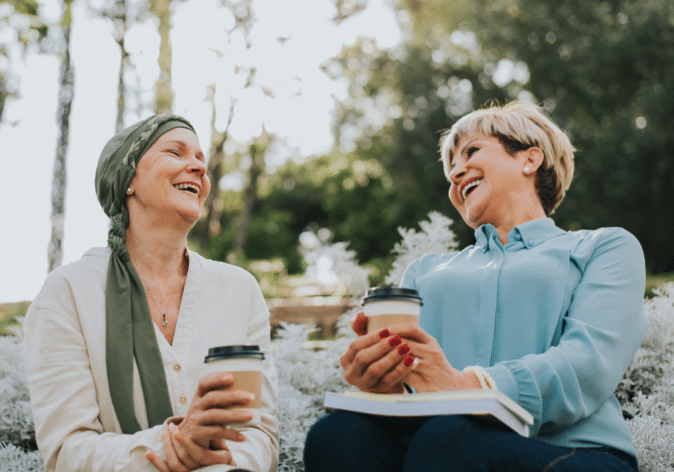Naveena Nekkalapudi is a member of the Breast Cancer Trials Consumer Advisory Panel, where members provide a patient’s perspective in the development of trials and the conduct of our research program. Naveena was diagnosed with stage 3, grade 3, triple negative breast cancer on Christmas Eve in 2014, after finding a lump in her breast during a self-examination.
Due to the long-term side effects from her treatment, Naveena is unable to return to full time work. However, she is still working part time and trying to make a difference to the lives of other people who have been diagnosed with breast cancer.
“Life before breast cancer was very different. I worked in several industries, and I was a bit of a workaholic. So, I started life in the dairy industry because I’m a dairy scientist by trade. I then worked for the public trustee, another organization, funds management, and finally for a health insurer.”
“I was the head of strategy there when I got diagnosed. And I was unable to return to work because the treatment I received did a lot of damage. So now I work part time, but I do a lot of stuff in the health system space.”
“I’m trying to make a difference for people who’ve been diagnosed after me, and I have all this skill set but I can’t work formally anymore so I want to use that skill set along with my lived experience to actually make a difference.”
Listen to the Podcast
We spoke with Naveena about her breast cancer diagnosis, the long-terms side effects from her treatment, and how she is working to make a difference to the lives of those who have been diagnosed with breast cancer.
How did you find out that you had breast cancer?
“So, I’d found a lump, but I put it down to being a cyst because there was an FM radio station that used to talk about checking your breasts on the first day of the month. This was after Kylie Minogue was diagnosed.”
“And every so often I would do it, and I found a lump. But then I googled it, which was a mistake now, in hindsight. And it said that it’s most likely a cyst, and to check it at different times of the month because of hormonal changes in your body.”
“So, I checked it a couple of weeks later and I couldn’t feel it. So, I just put it down to being a cyst and ignored it. Then over time, it started sticking around a bit more. It wasn’t coming and going like it used to. And because I’d made it a cyst in my brain, I didn’t worry about it. But then I felt my lymph node in my armpit, and thought that’s a bit weird, but I’m feeling great at the moment, maybe I just have a mild infection. It’s nothing, it’ll go away.”
“And it kept growing, and I developed this cough. Which later turned out to be nothing. But I thought a cough and inflamed lymph node must be something, so I thought I should go to the GP. Went to the GP and I explained how I had a cough and inflamed lymph node, but also this lump that used to come and go, but it’s sticking around.”
“My GP had a feel and said that she thought the lump and the lymph node might be connected. And that was the first inkling that there might be an issue. And then she gave me a referral for a mammogram and an ultrasound, and I had that done on Christmas Eve because I just wanted to get it out of the way, because I was convinced that it wasn’t going to be anything anyway.”
“So, half an hour after I got home, I got a phone call from my GP apologizing for breaking the news over the phone, but basically saying it’s bad news. It’s a tumor, and I just remember the white noise rushing past my ears. I was just thinking, ‘what?”
“I remember asking if it was benign or malignant, and I was trying to kind of try and steer it down the ‘it’s nothing major’ path. But she said, “I think it’s malignant and you’re going to have a pretty crappy year next year.”
“And I knew it had spread because I had felt the swollen lymph node. That was the reason why I was kind of extra worried because I thought it was spreading, and I knew the lump had been there for a while, because I’d ignored it, knowing it was there. So, it took two weeks to see a specialist, because it was a Christmas break.”
“And the two people I thought of straight away were Jane McGrath and Belinda Emmett, who were famous Australians who had died from breast cancer.”
“And then I had to give myself a mental slap and go how many people get diagnosed a year around the world? It must be in the millions. And they’re all fine, but you’re thinking about the two people who died, and that made the news because they died. I’ve got to calm down. I know the Australian health system is good, and we found it, so let’s just deal with it.”
“Every time I felt pain somewhere, I thought it was spreading, and it’s a tumor in your knee now, and it’s a tumor in your brain now. But because I had no experience with cancer, to me it was a death sentence.”
What was your biggest fear during this time?
“The first thing that went through my head was, I’m going to die. Because I thought it had been around for a while, so it had some time to spread, and it might be terminal.”
“I’m a carer for my parents, and I’d just bought an eight-week-old puppy, two weeks prior to that. And I just kept thinking I’m not going to see my puppy grow up. Who’s going to look after my parents? And all sorts of things, it was very melodramatic now looking back. But it was all going on inside my brain.”
“I didn’t show any emotions externally because I didn’t want to alert people to it for a couple of reasons. One, I wanted them to have a good Christmas and New Year’s because who knew what was coming and they might have bad ones for the next few years, if not forever, if I died or something.”
“So, I thought let them at least sleep for as long as I can let them have peace. But once I have to deal with it, they’ll know. The other reason being if someone said to you, I’ve got cancer, you’ll be saying how bad is it? What’s the treatment plan? Will you be okay? And I had no information.”
“And so, I thought rather than all of us sitting there not knowing, let me just deal with it and I can then I can work on my communication plan to all my stakeholders about what comes next.”
How did your family react when you told them?
“They were devastated. My poor family. My brother, who’s a GP, came down from Brisbane, because I live in Melbourne, and he helped me break the news to my parents. And we broke it to them on the Saturday, and I was having surgery on the Monday. And, in hindsight, I wouldn’t do anything differently because in a way, they’re just swept along on the journey. It doesn’t give them time to think at that stage.”
“Of course, once the surgery is done and you have some downtime before you start the next treatment, which is chemotherapy, I’m sure they were very upset. It’s hard, the whole process, but for me I would rather have cancer again than have to break it to them again because that was really, really awful.”
“So, my type of breast cancer at the time only had three options of treatment. One being surgery, the other being chemotherapy and then radiotherapy. The other subtypes have things like endocrine therapy and so on.”
“So, I started with surgery. They’ve changed it around now and I think now is a better way of doing it. But at the time, surgery went first. And so, they removed the lump, and they removed all the lymph nodes in my armpit because they thought four or five of them were affected.”
“It turned out only one was affected, but I lost all my lymph nodes, and that means that I’m susceptible to things like lymphedema. I then had chemotherapy for six months, and then radiotherapy, which was 30 rounds, which works out to be six weeks. It’s every day, Monday to Friday.”
“With the surgery, the first issue I faced was scar tissue. They give you exercises at the hospital, and there’s a physiotherapist who comes around and says, here’s a list of exercises. Do them, but don’t push yourself if it hurts. So, I didn’t push myself because it was hurting. And what it meant was that I had this thick almost guitar string, from under my breast up through my shoulder all the way down to my wrist, which was limiting my movement.”
“I couldn’t lift my arm past my shoulder. And apparently that’s called cording, and I had to go and see a special physiotherapist to break it. And they break it by basically digging their fingers into your flesh, where the scar tissue is, and pushing down and massaging it, and it’s very painful.”
“In terms of chemotherapy, most people think the extent of it is hair loss and nausea, but you actually don’t get nausea anymore because they give you steroids, but that means you’re hungry and you put on weight. It’s the opposite problem to what you think it is. And your family members overfeed you because they think you’re dying, and that’s the way of them showing you love.”
“But also, there were things like when your hair falls out, your scalp hurts. You don’t realize that, but it’s painful, because your scalp becomes very sensitive. You get ulcers in your mouth, you can either have constipation and or diarrhea, you get joint pain, your fatigue is bad. And with the radiotherapy, you get burnt basically, and some people end up with blisters. I fortunately didn’t, but you get this layer of skin that’s basically dried up and burnt and it itches, and it hurts at the same time, which is a weird feeling.”
“And there’s other people who have extra therapies, like endocrine therapy and Herceptin and so on, and they come with their own side effects as well. But in my case, those are the things that I had, and with the side effects, the other problem is, you think you can put up with it because it’ll only last as long as the treatment lasts, and then you can move on. But it doesn’t. It keeps going. And somebody said to me, it takes you two years to feel human again. And they’re mostly right. It’s taken me longer, but it’s quite a long process of recovery.”
“So, I look at my life now and I used to be a workaholic. I probably still am in some ways, but I used to do stuff for my head and now I do stuff for my heart. And trying to make somebody else’s life better gives me purpose, and it makes me utilise the experience I gained while I was employed, with the experience I’ve gained through the cancer treatment process.”
How are you feeling now?
“So, in my case one of the chemotherapies damaged my nerves, so I’ve ended up with chronic pain in all my major joints, which is why I’m unable to work full time anymore. But what I’ve done is I’ve used that as motivation to try and improve the quality of life of other cancer patients because there’s ways of actually being more targeted now.”
“There are some breast cancer patients for whom chemotherapy is of no use. And so, my advocacy around that is, if you don’t have to use it, one, it saves costs, but it’s actually saving them a lot of agony and pain and long-term side effects and a reduced quality of life.”
Before your diagnosis, what did you think about breast cancer?
“There was no cancer in our family, so I didn’t really know much about it other than there being a bunch of famous people who got diagnosed, and of course you know it’s in the breast. And you see people lose their hair and look unwell.”
“But then the moment treatment finishes, voila, they’re back to being normal again. But the depth of information and knowledge you gain when you’re going through it is endless, and you realise that breast cancer is different to bowel cancer, which is different to lung cancer.”
“They’re all very different in how you feel, and they’re all very different in the treatment process. There are also different subtypes of breast cancer, which have different therapy types. You go through the treatment and then you realise that unlike other chronic diseases, the breast cancer treatment or cancer treatment actually makes you feel worse.”
“So, you need a long recovery time at the end of it. I still remember I was filling out the form at work to get time off, and I filled it out and I was like ‘okay I’m going to have six months of chemotherapy, six-weeks of radiotherapy, and I think I’ll finish up mid-September. So, I’ll take a couple of weeks off, and then I’ll be back in October.”
“And Human Resources had filled out the same form at work, and the human resources person had given me time off till February the following year. And I’d forgotten that you need time to recovery from the treatment, and I’d forgotten about how bad the treatment makes you feel.”
“I think the other thing I learned is before I went through the treatment, I thought I would go back to who I was. I would take time off, have my treatment, finish treatment, and then go back to the person I used to be. And the thing is, nobody does. You’re changed, both mentally and physically.”
“So, there’s so much information and experience that I’ve gained going through it. Someone once said to me, they napalm you and see what grows back, and they’re right. You feel like they’ve basically slammed you, and you come crawling back and try and rejuvenate to being who you used to be.”
Why is it important to try and find kinder treatments with fewer side effects for breast cancer patients?
“I think it’s important because so far I think the focus of treatment has been to save the person’s life, which is great, we really appreciate that and the patient is all for having their life saved, but what happens is you then have to live with the consequences of the treatment, and the side effects that go on for life.”
“And once upon a time we had a very blunt instrument of surgery to remove the entire breast. And then we started looking at other ways of treating breast cancer and stopping it coming back. So, we added radiotherapy and chemotherapy, and now we’ve added endocrine therapies and immunotherapies and so on.”
“So, we’re getting better at realizing what works, and getting better at finessing, but we’re not there yet in the sense of applying it to the wider population. And so, I think it’s necessary to start being more finessed in how we treat patients because some of us will live for 30, 40, 50 more years with the consequences of the treatment that we’re given.”
If you could share a message to the thousands of people who donate to Breast Cancer Trials, what would you say?
“Firstly, I want to say thank you to them because the money that they donate goes towards cancer research, and it saves lives. Clinical trials are critical because we need to get better at finessing things, and we also haven’t dealt with the problem entirely.”
“Breast cancer has a 92 percent survival rate, but it differs for the different subtypes. If you take it on average, there’s still 8 percent of people dying. One in seven women get diagnosed with breast cancer. And it could be you, or your family member, or a friend. And it takes a toll on the community.”
Putting money into clinical trials research helps the end outcome, and it helps improve outcomes for people who’ve got breast cancer. I would also love it if we had no more deaths from breast cancer. I know it’s a pie in the sky kind of ambition, but while people are working on that, my focus is very much on improving quality of life outcomes for people who’ve been diagnosed with breast cancer, and getting more finessed on how we deal with it.”
“And so that’s why I joined Breast Cancer Trials as a consumer on their Consumer Advisory Panel because I want researchers to be aware of the issues that people who’ve been treated for cancer face.”
Our life-saving breast cancer research is only possible thanks to the continued generosity of our supporters. Please help continue this vital work by making a donation today.



